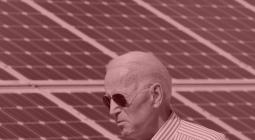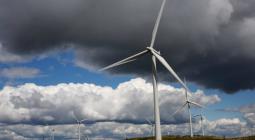Climate groups launch national tour for Green New Deal

Exclusive: multistate tour, launching in Michigan on Sunday, aims to pressure Biden on climate action before 2024 election
One year after the passage of the much-lauded Inflation Reduction Act, a coalition of organizers and representatives are relaunching the push for a Green New Deal with a national tour.
“The Inflation Reduction Act was the largest climate investment in US history,” said John Paul Mejia, a national spokesperson for the youth-led climate justice organization the Sunrise Movement, one of the groups hosting the tour. “But for the next 10 years, we should work to make [it] the smallest by winning stuff that’s much larger.”
The tour, which kicks off with an event in Michigan this month, will aim to showcase widespread support for even bolder federal climate action, and will feature Green New Deal champions including Senator Ed Markey of Massachusetts and the representatives Ilhan Omar, Jamaal Bowman, Cori Bush and Summer Lee alongside local advocates. It will be led by the Green New Deal Network, a coalition of progressive environmental groups that include the Sunrise Movement, Greenpeace and Climate Justice Alliance, social justice organizations such as People’s Action and the Movement for Black Lives, and the small left-liberal Working Families political party.
Supporters are calling for stronger executive action as well as the passage of a suite of proposals in Congress.
“With our Green New Deals for public schools, housing, cities and more, we can make historic investments that transform our communities by repairing damage done by the fossil fuel-driven climate crisis and giving every person the resources they need to thrive,” said Representative Bowman.
The Green New Deal – a plan to rapidly and fairly decarbonize the US economy and create millions of jobs in the process – swept the US progressive political scene during Donald Trump’s presidency. The Sunrise Movement in 2018 held sit-ins on Capitol Hill calling for its implementation, and months later, Markey and the New York representative Alexandria Ocasio-Cortez unveiled an official resolution fleshing out the proposal.
The ambitious, sweeping vision hinged on the idea that tackling the climate crisis could entail the remaking of US society to be more just, prioritizing communities most affected by inequality, climate disasters and pollution. It sharply contrasted with previous national decarbonization plans, such as the failed 2009 attempt to create a cap-and-trade system for planet-heating pollution known as Waxman-Markey.
“During that ‘Inconvenient Truth’ era, climate advocacy was very technocratic in some ways,” said Kaniela Ing, the national director of the Green New Deal Network and a former Hawaii state legislator, referring to the 2006 documentary on the climate crisis by the former US vice-president Al Gore. “But the Green New Deal was about how all these things are connected, how climate is connected to schools, better infrastructure … things that people actually want.”
Once Joe Biden was elected president in 2020, Green New Deal advocates focused on pushing him to adopt similarly bold climate policies. The movement has been widely credited with helping ensure the Inflation Reduction Act – known in earlier iterations as Build Back Better – included a groundbreaking $369bn for climate and renewable energy spending.
“Since we introduced the Green New Deal resolution in 2019, we’ve succeeded in putting climate at the top of the political agenda,” said Markey. “We held the line on ‘no climate, no deal’ during the Build Back Better negotiations, which then resulted in the movement that won the Inflation Reduction Act, which was an historic accomplishment.”
Markey said the Inflation Reduction Act “represented a major down payment on the Green New Deal”. Yet the policies have crucial differences. Green New Deal advocates noted that it included giveaways to the fossil fuel industry, including mandating drilling and pipeline deals, and that it did little to wind down planet-heating coal, oil and gas. Many also lamented its meager attempts to protect worker conditions. It also placed less focus on improving public transportation and climate-resilient affordable housing, said Sophia Cheng, the climate justice campaign director at People’s Action, a progressive advocacy and political non-profit.
“We want more comprehensive climate solutions that have those benefits for the frontline communities,” she said.
The Inflation Reduction Act also relied more heavily on incentives for private companies than many progressives would have desired.
“The Inflation Reduction Act had the fingerprints of the Green New Deal, but it did sort of take the path of least resistance in that it just infused cash into corporations to hopefully change their behavior,” said Ing. “We want to see more focus on building up public institutions so we have more democratic control.”
Ing said a stronger climate platform could help Biden win over young people who are disillusioned by his recent pro-fossil fuel actions such as greenlighting the Willow drilling project in Alaska this year.
Though the Green New Deal is a federal policy proposal, the new tour will attempt to place a focus on its potential impacts at the local and state levels.
“The vision is people controlling their own resources at the hyperlocal level, and having those federal investments help them do that,” said Ing.
Since the initial 2019 introduction of the Green New Deal resolution, new supporters of the vision have been elected.
“Western Pennsylvania – what used to be a playground for fossil fuels – sent a Green New Deal politician to Congress, knowing I’ll fight not only for our children’s health, but for worker power and good union jobs,” said Lee, who was elected last year.
The first stop will be Dearborn, Michigan, on 5 November.
“Nearly a decade after the Flint water crisis, frontline and Bipoc communities in Michigan are still disproportionately burdened by continuing water and air pollution, hazardous waste from fossil fuel facilities and inadequate energy access,” said Mikal Goodman, the campaign manager at Michigan Alliance for Justice in Climate, whose group will co-host the event. “We’re not going to sit by and let President Biden campaign on climate as a done deal while people in our communities are getting cancer from pollution and kids can’t breathe on the school playground.”
Before the end of the year, organizers said, they plan to hold additional events in Pennsylvania, Iowa, Missouri, California, Illinois, Minnesota and Massachusetts – locations chosen for their strong bases of Green New Deal supporters and histories of supporting and winning progressive policies.
“We’re taking the road to cities across the nation with one clear message: we’re just getting started,” said Markey.
-
This article was amended to add the Working Families party to the list of organizations participating in the tour and to remove SEIU from the list
Photograph: Chip Somodevilla/Getty Images








